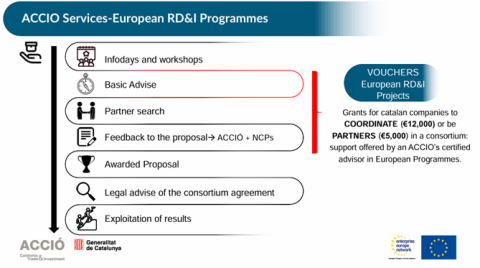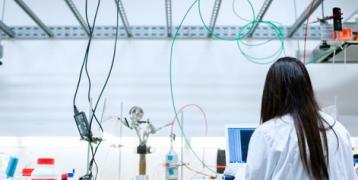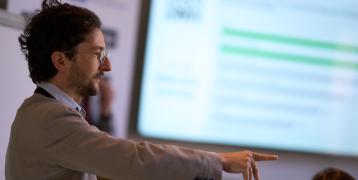Enhancing S3 interregional collaboration: effective policy support tools: key learnings

On 26 March 2025, the Policy Learning Platform organised an online matchmaking session for the benefit of Science Malta.
Objective and context of the matchmaking
Malta benefited from an S3CoP Targeted Support Assessment (TSA) on Interregional Collaboration, which was approved by the EU Commission in January 2025. The S3CoP report provided tailored policy recommendations to enhance Malta’s capacity for active participation in European interregional initiatives.
This matchmaking session aimed to explore key recommendations from the S3CoP report by offering European good practices drawn from Interreg Europe project stakeholders and insights related to two specific actions:
1. Establishing the Malta European Research and Innovation Network (MERIN)
MERIN would aim to coordinate and integrate existing networks to bring together Malta’s key stakeholders engaged in European projects. Its activities would include:
- Hosting an annual event to present R&I initiatives and funding opportunities.
- Sharing tools, calls, and success stories.
- Publishing a quarterly newsletter.
2. Launching the Malta Fund for European Projects (MAFEP)
Led by Science Malta, MAFEP would aim to support national stakeholders in an integrated manner through four complementary pillars:
- MAFEP Ideas – Identifying funding calls and project ideas.
- MAFEP Design – Facilitating the development of high-quality project proposals.
- MAFEP Monitoring – Supporting the monitoring of European projects.
- MAFEP Expertise – Assessing S3 sub-priorities and their alignment with national S3 priorities.
Policy Challenges
Malta faces a key challenge: limited participation in interregional networks, which hinders its ability to fully leverage European cooperation for its national S3 goals. Strengthening access to these networks is essential to:
- Build critical mass.
- Accelerate deployment and scaling of technologies.
- Tap into complementary expertise and resources.
In response, Science Malta is committed to enhancing interregional collaboration as a core pillar of the national S3 strategy by identifying best practices and actionable opportunities.
Key insights shared during the matchmaking
During the matchmaking, several key recommendations were shared by peers to help Science Malta in enhancing interregional collaboration:
- Take advantage of capacity-building initiatives such as Interreg Europe Policy Learning Platform, S3CoP, or Interregional Innovation Investments (I3) Support Facility to strengthen capacities for interregional collaboration and raising awareness regarding Maltese’s RDI assets.
- Engage with experienced partners and regions such as ACCIÓ (Catalonia), which has a dedicated Brussels-based team supporting interregional cooperation and project development, and Hauts-de-France, which has successfully developed transferable funding support schemes like FRAPPE.
- Utilise a Brussels-based office to actively participate in networks such as ERRIN and UNILION to enhance visibility, access new partnerships, participate in funding call info days to find consortia, and stay aligned with EU innovation agendas and funding programmes.
- Actively involve SMEs by showcasing success stories and good practices that demonstrate the value and feasibility of European project participation (see the example of Pomorskie Voivodeship, Poland).
- Facilitate collaboration with major players to help local SMEs integrate into broader European value chains and innovation ecosystems.
- Prioritise proactive regional ecosystems by partnering with stakeholders who show initiative and alignment with Malta’s S3 priorities.
- Target the use of simple, flexible, and low-bureaucracy support tools, such as Financial Support to Third Parties (FSTP) in the form of cascade funding (see Euroclusters or I3) to give SMEs an easy and practical entry point into European collaboration and project implementation.
- Adapt funding tools to reflect the diversity of stakeholders by differentiating support based on:
- Role in projects (leader vs. partner)
- Level of experience (expert vs. beginner)
- Type of organisation (e.g., SMEs, research centres, public authorities)
- Embed financial tools within a comprehensive and integrated support process, combining funding with:
- Capacity-building
- Technical guidance
- Ongoing follow-up and mentoring

Figure 1. ACCIÓ services to support interregional collaboration. Source: Jennifer Ruiz, ACCIÓ-Competitiveness for Catalonia, Spain.
- Leverage AI tools to support:
- Proposal writing and structuring
- Summarising funding calls and thematic trends
- Detecting emerging opportunities more efficiently
- Use brokerage events, info days, and matchmakings to:
- Expand professional networks
- Identify strategic project partners
- Form competitive consortia for programmes such as in Horizon Europe
- Utilise data-driven monitoring platforms to map existing interregional collaborations and inform strategic decisions—e.g. Catalonia’s RIS3-MCAT platform, which uses semantic analysis and data visualisation to support evidence-based policymaking.
Additional Sources of further information





